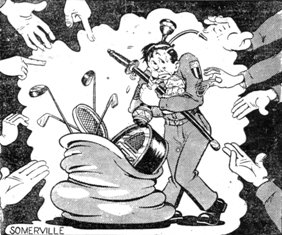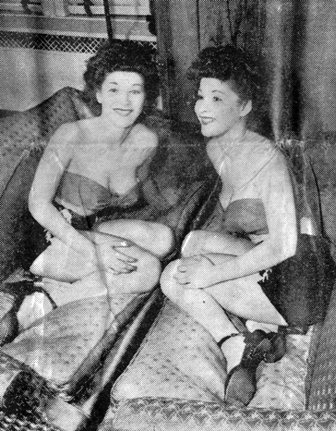
Mirror Provides Unexpected Dividend |

Vol. III No. 40. Delhi, Thursday, June 7, 1945. Reg. No. L5015 |
|
Aimed At Japanese
Roundup Staff Article
Harassed and groggy after ever-increasing aerial blows, residents of Japan's main cities once more sought shelter underground this week as Super-Forts rode high and unchallenged over the island kingdom. But, for once, the giant planes did not only unleash cargoes of flaming death. Huge paper bombardments also rained down on the cities, spraying millions of propaganda leaflets over wide areas.
Text of the leaflets was soon revealed by Radio Tokyo, which reported they were signed by President Truman and advised the Japanese people to get out of the war or face the same destruction that was accorded the German people. "Unconditional surrender," the broadcast reported the pamphlets as reading "would not mean obliteration or slavery for the Japanese people."
TWO 'K.O.' PUNCHES
However, Uncle Sam's airmen backed up the threats implied in the propaganda warfare with two "knockout" punches aimed at Nippon's "glass jaw" - her concentrated industrial empire.
As Maj. Gen. Curtis S. Lemay, Commander of the 12th Bomber Command, assessed the results of last week's destruction raids on Tokyo in an announcement that 51 square miles surrounding the Imperial Palace grounds in the heart of Japan's capital city are "great masses of gray ashes and fire-blackened ruins of the few buildings left standing." Super-Forts struck in force at Yokohama and Osaka.
HEAVIEST DAYLIGHT RAID
Tuesday, more than 450 B-29's returned from the heaviest daylight raid on Japan and reported giant fires were burning all over the industrial section of Tokyo's port city of Yokohama. Later the enemy High Command conceded that "considerable damage" was inflicted and reported a high wind was spreading fires throughout the city's automotive, aircraft, shipbuilding and rubber plants. Aerial photographs revealed that the raid, in which 3,200 tons of incendiary bombs were dropped, had burned out nearly seven square miles of Yokohama's principal business and industrial center.
The Super-Forts were out again Friday, this time striking at the manufacturing center of Osaka. More than 450 bombers, escorted by 150 Mustang fighters, dropped 3,200 tons of bombs. The attack was concentrated on harbor facilities, shipyards, warehouses and factories. Reports indicated that 86 square miles of Japan's most highly industrialized city were destroyed or heavily damaged and Japanese broadcasts admitted that flames started throughout the manufacturing heart of the city were only gradually being brought under control.
The naval air force was out in strength, too. Striking on two successive days, planes attacked Southern Kyushu airfields from which the Japs have been launching suicide aerial attacks against the American fleet. Meanwhile, the Jap government announced that the entire naval air corps of Japan has been converted into a "suicide corps" for attacks against Allied warships.
Speaking before the Japanese Cabinet Wednesday, Premier Admiral Baron Kantaro Suzuki declared that the battle of Okinawa is the deciding battle of the war and that the fate of Japan depends on its outcome. Radio Tokyo broadcast: "Our hopes and determination to win this war are anchored solely on the outcome at Okinawa" and, in a later report, admitted "Japanese losses on Okinawa are gradually increasing."
Fighting on rain-drenched Okinawa was still the bloodiest of the Pacific war. Casualties on both sides were heavy. (Jap losses averaged 1,000 dead per day), but the Americans held all the aces; they could bring an unending stream of fresh replacements up to the battle line; the Japs, cut off by a sea and air blockade, could not.
U.S. Units Withdrawn From EAC
Roundup Staff Article
The vast part played by the USAAF in air operations over Burma and India with Eastern Air Command has come to an end with announcement this week that American units are being withdrawn.
It was also announced that Lt. Gen. George E. Stratemeyer, whose nomination to lieutenant general was approved by the Senate this week, has been relieved of his post as Air Commander of EAC, but will head the USAAF in the India-Burma Theater.
EAC, which from now on will be a Royal Air Force organization, will be headed by Air Marshal W. A. Coryton as Air Commander, the post held by Stratemeyer since formation of the EAC in December, 1943.
CHANGE TO OFFENSIVE
When the USAAF, RAF and RIAF were combined into EAC in 1943, Allied forces in India were on the defensive. The British were holding on to their footholds in Western Burma, after an abortive offensive by the Japanese against Bengal.
It was in Western Burma, in the Arakan fighting, that the shape of things to come began to assume definite shape. British units on the slopes of the Mayu range, cut off from land supplies, were supplied by air drops.
Later, the process of air supply was continued and expanded with the Wingate Chindit expedition into the Burma jungle. For the first time, planes took off from jungle strips to evacuate wounded.
SUPPLIED BY AIR
As Uncle Joe Stilwell shoved off on his invasion of North Burma, American Troop carrier and ATC planes supplied him by air as fighters strafed Nip airfields and bombers hit their installations and communication lines.
When the Japs invaded Manipur in an attempt to cut the Assam supply line, air support rose to its peak. The battered British formed a defensive box at Imphal, entirely supplied by air with Japs on all sides. An entire division was transported with equipment.
The Jap attack was repulsed and as Stilwell's troops triumphantly pressed into Myitkyina, the British 14th Army began its long chase of the retreating Nips that was to culminate in the withdrawal of the outflanked enemy from Rangoon.
The pattern continued as the troops of Northern Combat Area Command, now under lt. Gen. Dan I. Sultan, the British 14th Army in Central Burma and the British in the Arakan pressed forward. Firm Allied control of the air was held, keeping our supply lines open and destroying the enemy supply and communication lines.
In a special order of the day, Air marshal Sir Keith Park, SEAC Air Chief, stated, "Without the support of American Air Forces in Burma, we could not have defeated the Japanese Army so rapidly and decisively in 1945."
Stratemeyer, in turning over his Allied post, paid tribute to the fine spirit of co-operation between the USAAF and RAF.
A native of Cincinnati, O., Stratemeyer is a graduate of West Point. June 12 will mark his completion of 30 years service in the Army. He is a graduate of the Command and General Staff School, Army War College and Air Corps Tactical School. Before coming to CBI, he was Chief of Air Staff, Hqs., USAAF in Washington.
TRAGIC HOMECOMING FOR I-BT SOLDIER
Roundup Staff Article
For three years, Pvt. David Sharp awaited the day when he could return home from the India-Burma Theater and see his high school sweetheart, Lulu Mae Davis.
Last week, he arrived in the U.S. and eagerly hurried from his Kansas City, Mo., home to visit Lulu Mae. Five minutes after he arrived, she was dead, murdered by her jealous father.
Lulu Mae died that Sharp might live. When the former I-B soldier entered the Davis home, the father, Ray, a 42-year-old furnace repair man, flourished a .38 revolver.
The girl threw herself in front of her sweetheart. Sharp ran from the house as Davis waved the gun. The infuriated father turned the gun on his daughter and shot her dead. Then he fled. Later, he was found a suicide with the same gun he had used to kill Lulu Mae.
The shooting was witnessed by two other daughters, Mildred, 19, and Wanda, 14. Mildred said her sister said, "Please don't shoot," just before the bullet went through her heart.
Police said everything that could be learned about Davis showed him to be insanely jealous of his three daughters. He left a note before fleeing. It said: "The only way to take care of a skunk is to kill him. When you have a daughter that's been hanging around a skunk, the only way to keep her from being hurt is to kill her. I'm not sorry."
The slain girl's mother, Mrs. Wilda Davis, said her husband was particularly bitter towards Sharp, because he was the only boy friend the girl would not give up.
 Returned from his trip from the ETO, Roundup's M/Sgt. Fred Friendly, left, presented a Nazi flag to Maj. Gen. Frank Merrill, center, and a German machine-pistol to Lt. Gen. Dan I. Sultan, right.
Returned from his trip from the ETO, Roundup's M/Sgt. Fred Friendly, left, presented a Nazi flag to Maj. Gen. Frank Merrill, center, and a German machine-pistol to Lt. Gen. Dan I. Sultan, right.
|
12TH ARMY FORMED
Roundup Staff Article
The British this week announced formation of new SEAC Army, the 12th, under the command of Lt. Gen. Montague Stopford, to be based in Rangoon.
In the meantime, the 14th Army continued its mopping up operations in Burma, with the enemy making desperate attempts to keep open his escape routes to the east.
At the "Kama" escape route, north of Prome and east of the Irrawaddy River, the British killed 1,221 Japs in a series of engagements.
In the Kalaw, area Empire troops have captured a "staircase," which goes up to the mountains northwest of Kalaw. This was rugged terrain and presented difficulties comparable to any in the entire Burma campaign.
The Japs are resisting in Burma from Pegu in the south to Mawchi Road in the north. British reports say the enemy is just as fanatical as ever in his resistance. During the week, planes of Eastern Air Command hit troop concentrations in Moulmein and attacked the jetty area in Martaban.
STILWELL LAUDED FOR HEROIC DEEDS
NEW YORK - (UP) - The Novelli Post of the American Legion here this week awarded Gen. Joseph Stilwell a medal for heroic deeds in CBI and for "laying the ground work for certain ultimate victory in the Pacific."
Stilwell sent a message to the post saying, "In the face of great achievements by millions of our fighting men, one cannot be other than humble when his efforts are compared and found worthy."
PLANE 297 SETS HUMP MARK
1330TH BU, ASSAM - Plane 297 has achieved the most Hump trips, highest number of flying hours and best utilization record for two consecutive months.
The plane flew 321 hours and five minutes in April under adverse weather conditions. Since assignment to this base in November, 1944, it has flown 1,613 hours in 167 assigned days.
CALCUTTA - Completing a tour of inspection of Postal installations in the India-Burma and China Theaters, Brig. Gen. W. E. Chickering, commanding general of the Army Postal Service, this week declared that "fewer complaints about mail have been heard in this Theater than anywhere else overseas." The Army Postal chief pointed out that postal service in the India-Burma Theater is the best provided for Army troops overseas, declaring that "India-Burma and China are the only two theaters where mail has a blanket air priority." Included in Chickering's inspection itinerary was a study of the Calcutta Base Post Office, where more than 40,000 pieces of mail per day are checked for correct addresses and re-routing. |
Announced By Combat Command
KUNMING, CHINA - presence in China of two United States Army Ground Forces units, the 475 Infantry Regiment and the 124 Cavalry Regiment, has been announced by Maj. Gen. R. B. McClure, Commanding General of the Chinese Combat Command.
It was disclosed that both of the American units were flown from Burma to China by ATC several weeks ago. A small part of the movement was over the Stilwell Road.
The two regiments were part of the Mars Task Force.
On the Chinese ground front, troops striking down the Kwangsi-Kweichow railroad have reached the vicinity of Ishan, 43 miles west of the former American air base at Liuchow, which field, reports say, the Japs may be preparing to evacuate.
INROADS ON CORRIDOR
Announcing this new success, the Chinese high command reported fighting along a 900-mile front, with the Allied forces making new inroads from the western side of the enemy corridor, stretching from the Yellow River to French Indo-China.
Ningteh, 45 miles north of liberated Foochow, was recovered, and the Japs were reported retreating toward Saipu, near the coast, 75 miles northeast of Foochow. In Honan Province, at the northern end of the 900-mile line, Chinese forces were attacking northward in the direction of Shanhsien, less than 50 miles east of the Honan-Shensi border.
PUSHING SOUTHWARD
The Chinese high command also announced that Japanese troops were pushing southward along the East China seacoast in Chekiang province in a possible attempt to establish a new anti-invasion line even as they gave ground in other sectors.
In the advance from recently recaptured Nanning, the Chinese have pressed along the highway leading southwest into Indo-China and have reached the vicinity of Shulo, more than 60 miles from Nanning.
|
Gen. Somervell Lauds Builders Of Pipeline Roundup Staff Article Gen. Brehon H. Somervell, chief of U.S. Service Forces, this week commended Lt. Gen. Dan I. Sultan, commander of United States forces in IBT, and men under his command for the speedy construction of the pipeline to China. In his message to Sultan, Somervell said, "I want to congratulate you and the men who have been responsible for the completion of the four-inch pipeline into China two and a half months ahead of schedule. The difficulties which you have overcome are understood and appreciated in Washington." Planned initially at the Quebec Conference in August, 1943, work on the fuel line which now stretches across the wildest terrain in the world, from Calcutta to the interior of China, was started in December, 1943. Construction of the pipeline - built by petroleum distribution companies staffed by trained pipeline technicians - was under the supervision of Col. William C. Kinsolving and Lt. Col. Birnery K. Morse. |
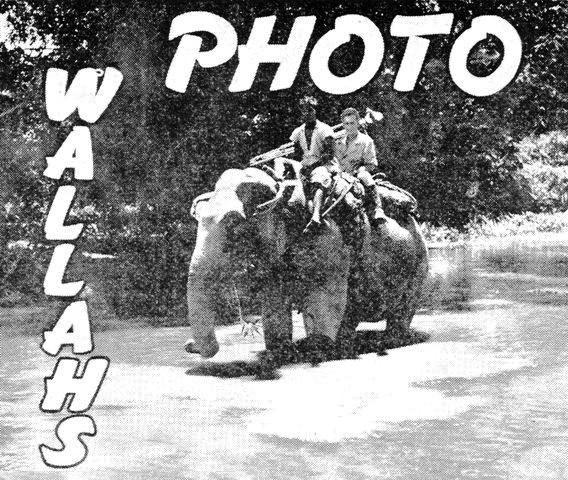
|
The mission of the 164th Signal Photo Company in the India-Burma and China Theaters is measured not only in the amount of celluloid footage taken - which is considerable - but also in the success it realizes in telling through the medium of pictures, the story of the passing parade in East Asia. And the story of the 164th itself is an integral part of each step in that historic parade.
The first echelons of the unit reached the Theater 18 months ago. Now, with detachments stationed in almost every station from Calcutta to Chungking, the credit "Signal Corps Photo" in a Roundup cut line or a U.S. press release from this area usually indicates another click of a 164th camera.
As with every other outfit that operated from early Ledo Road days until the opening of the Stilwell Highway, it's been a rough row to hoe. However, the toughest days, say the men who focus the cameras, have often been when not a single foot of film or a single negative was exposed. The job of taking pictures of Japs - dead or alive - becomes increasingly difficult when the subject fails to co-operate by putting in his appearance. And for many days along the trail or in the mountain vastness, very few if any of the enemy were sighted.
T/3 Victor D. Solow, Moscow-born New Yorker who came to the U.S. in 1936, is one of the top members in the motion picture department of the unit. Solow was one of the few Americans who accompanied the Chinese in their drive from the Salween in southwestern Yunnan down to a junction with the forces moving up to the Burma Road from the west.
Most of the stories Solow has to tell about the campaign concern the pictures he didn't get. He was profoundly disappointed in missed opportunities to be at the right place at the right time. During one stage in the operations against the Japs on Sungshan (later dynamited in a daring mission that sent all the Nips to join their ancestors), Solow sweated it out on a neighboring mountain top for four days waiting to get a panoramic picture of 14th Air Force P-40's strafing the holed-in enemy. The whole deal would have taken a couple of minutes had it come off, but each day something came up to call off the scheduled mission. He gave up in disgust at the end of the fourth day, and, as luck would have it, the tiger-toothed pee-shooters came over on the fifth day to make their passes, which never were recorded for posterity.
On another occasion, Solow eluded his two Chinese "assistants" who were charged with making certain he kept out of trouble. It was during this period the Chungking radio was announcing the fall of Lungling to the Chinese. In reality, there was still a lot of street fighting going on in the town. So he hightailed into the middle of it, and returned with some of the best pictures of the campaign.
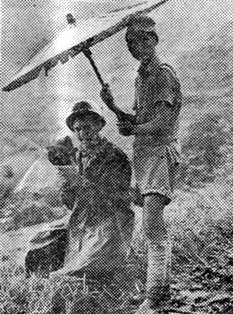 Pfc. Victor D. Solow, Signal Corps cameraman, and his assistant, a Chinese soldier, shield Solow's
cameras from the
rain somewhere along the Salween.
Pfc. Victor D. Solow, Signal Corps cameraman, and his assistant, a Chinese soldier, shield Solow's
cameras from the
rain somewhere along the Salween.
|
Still alone, Solow bedded down for the night. But the following morning, warning came that a Jap patrol was somewhere in the neighborhood. He loaded his paraphernalia on his horse and set off for American headquarters. It wasn't a minute too soon, as a machine gun started sputtering, and the dust all around him gave a pretty good indication that the Japs were getting the range. he didn't get any pictures during that escapade because, as he puts it, "The Allies were making their Normandy invasion at the time, and I couldn't see the advantage of competing with that kind of news. Anyway," Solow says, "I had 27 miles of walking ahead of me and all the advantages outweighed the disadvantages."
The current Stateside meat shortage gets no sympathy from Photographer Solow. With T/4 George Kocourek, of Los Angeles, he was with the Chinese at Tengchung, and weather had precluded any recent food drops. Subsisting on the barest of Chinese rice rations for five days, the two Americans found a dog, not alive and kicking, but dead. Necessity overcame natural aversion at this point, and they gathered up some wild tomatoes, cooked the meaty portions of the mongrel for three hours, and turned up with some "very satisfactory stew." In fact, says Solow, the change from K-rations was delightfully appetizing at the time.
T/3 Dan Novak, from Minneapolis was with the Northern Combat Area Command from April of last year until his recent shift to New Delhi. He was with the Chinese from Myitkyina to Lashio and made a full record of the entire operation. He landed upon the Myitkyina strip with the Airborne Engineers, first unit to hit the field in gliders. With the Japs on one end of the strip and the Americans unloading equipment on the other, Novak filmed the story. He was awarded the Bronze Star Medal for his performance under great difficulty.
Novak's outstanding movies, however, were not those for which he received the medal but later pictures at Bhamo. With the Japs entrenched 125 yards away, he photographed the dive-bombing exploits of a flight of P-47's as they made repeated passes at the target. It was comparatively safe, he says, because the target was clearly outlined and the pilots had a good bead.
T/4 Frank W. Shearer, New Kensington, Pa., was Novak's partner for the Bhamo pictures. Shearer photographed the stills, but came out second best on the deal. He decided that he was going to try and get some artillery bursts on the same target, but while maneuvering for position he got nicked with a .70mm "whiz-bang" shell. The high velocity bullet just grazed him, however. Wearing a Purple Heart he was soon out of the hospital and back with the "click-corps."
Shearer was with Lt. Gen. Dan I. Sultan at Lashio when a Jap artillery shell landed 30 yards from their jeep. As on many another occasion, no pictures were photographed here - with the task of getting out of range being more important at the moment.
Two other Purple Hearts were awarded to members of the 164th. T/5 Milt Koff, Hawthorne, Calif., was with Merrill's Marauders at Nhpum Ga, where he was wounded, and Pvt. Tommy Amer, Los Angeles, favorite of generals and celebrities who found their way to the Burma jungles, suffered a burned finger as the result of enemy action.
Other Bronze Stars were awarded to T/4 Charles Zimmerman, Los Angeles, and Pfc. Don Pringle, Everett, Wash. Pringle knocked out a Jap machine gun nest at Bhamo (in addition to his other duties) and killed three Nips. Zimmerman accompanied an early survey trip on foot over The Hump to China. T/4 Louis W. Raczkowski, Syracuse, N.Y., also received the Bronze Star for his action artillery pictures at Bhamo.
One Air Medal has been awarded to a member of the unit. T/4 William Safran received the citation for his work during the initial glider operation at the Myitkyina landing.
T/3 William Brown, Los Angeles, is one of the old timers of the outfit. He's been up in the weeds almost as long as the weeds, according to his compatriots of the rear echelon. It fell to Brown to make the first pictures of a tank operation in Burma at Shadazup last year. The tank in which he rode got into trouble, however, and fell over on it's side in the line of fire from both sides. The crew slipped out the escape hatch and made their way back to the American lines without injury.
Pfc. Tom Fanning, Wichita, Kans., tells the outfit's favorite story. He received considerable publicity last year in the Roundup for "capturing" three Japs in Burma. The story, as it appeared, chronicled that Fanning had been in a tree taking some pictures of a particular road. He had left his carbine at the foot of the tree. As he went about his work, three bedraggled figures appeared on the road below and, thinking they were Chinese, he yelled for them to get out of range of the camera - they were in the way. However, they came on, and he soon discovered that they were Japs who wanted to give themselves up. So "with his camera," said the story, "he captured the three Japanese."
Actually, Fanning was sound asleep in his hammock one dark night when he felt a tap on his shoulder. He awoke to find three starving, sickly Japs who were following instructions given in American propaganda leaflets. They wanted to give themselves up in exchange for food and medicine. Fanning, without further ado, turned the three over to the MP's and rolled over to sleep again.
Capt. Herbert Reed of Atlanta, Ga., is the 164th's rear echelon big stick, and Capt. Dave Burman, Cleveland, O., is the man responsible for the men in the field.
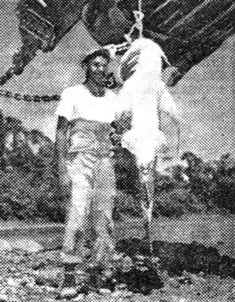
In The Bucket |
By SGT. C. M. BUCHANAN Roundup Field Correspondent
ALONG THE STILWELL ROAD - The latest man-bites-dog incident turns out to be a fish story.
S/Sgt. Charles T. Hardin, Trenton, Tenn., power shovel operator for an Engineering Battalion along the Stilwell Road, used the world's largest fishing tackle to bring in a 100-pound catfish out of the Dihing River.
Hardin, a Negro engineer, was scooping up gravel from the river's bed, as it had been his custom to do over many months since he has been in ol' I-BT. He noticed a massive, torpedo-like form wending its way up to the spot where his shovel was operating.
Giving the controls a quick one-two, Hardin hit the lumbering fish with the big bucket and stunned him into insensibility. Then, skillfully maneuvering the huge snorting shovel, he hauled him in as easily as dipping for a trout.
His piscatorial prize turned out to be a white bellied catfish, measuring almost six feet from tail to teeth. As Hardin put it, "I've scooped up a lot of gravel to help build this road, but I never caught anything bigger than a minnow before. This time I hit the jackpot."
After the fish was hauled off to the company area, the boys began slicing off steaks for a fish fry was contemplated.
A real tribute was paid the Stilwell Road Isaac Walton by one of his buddies, who remarked, "Old Hardin can throw that bucket anywhere he wants."
|
Dear Roundup: I am with an organization which has been bouncing around the Theater for about 15 months. We have a pretty fancy T/E which authorizes several genuine American flags. However, during this time all requisitions, pleading and appealing to the finer instincts of the Quartermaster or anyone else connected with flags have been to no avail.
It has always seemed a good idea to be able to display the Stars and Stripes on various occasions as a symbol of what we are here for, but it appears that either the War Department does not want anyone to advertise the fact there are American troops in this area or else flags are considered a non-essential item of such low priority as not to be issued.
If you have a better answer or know any angles than can be executed to get one flag, service, please let me know.
- Lt. Wayne R. Flight, APO 689 (Burma).
(Quartermaster Corps in New Delhi says they've got the flags; put a requisition through proper channels and the flag will be on its way. Reminder: Flag Day is June 14. - The Editor.)
PICK 'EM UP
Dear Roundup: I have seen thousands of G.I.'s waiting on the roadside for a ride. Some get picked up; some don't.
There are thousands of cars and trucks running up and down the Stilwell Road, so there is no reason to cause a G.I. to walk unless he wants to.
But some proud drivers think they are too good to pick up their comrades, so unfortunately we have to use our feet most of the time when we want to go places. being in this hell hole of sweat, rain and mosquitoes is bad enough for anybody, but when your buddies don't even do you a little favor once in a while I wonder what we are fighting for.
I'm sure many G.I.'s agree with me, so let's help each other while we can.
- Name withheld.
APPRECIATION
Dear Roundup: I know it's an anomaly for a private in the Army to write a letter of praise and recommendation for officers, but in this case I feel I must.
I've been in the I-B Theater for 23 months, and I've been in the hospital several times during that period with the illness that one gets over here.
In all my life I've never seen a finer, friendlier, kindlier and more sympathetic bunch of medical officers than they have at the station hospital here. They're always going out of their way to make life more pleasant for the patients. Even the ward boys rate a cheer for their helpfulness. The Red Cross here is also on the ball, coming around daily with snacks, candy and soap.
By writing this letter, I and others hope we can show our appreciation to the hospital staff.
- Pvt. H. Weinbaum, APO 466.
Colonel Williams Commands Veteran 80th Fighter Group
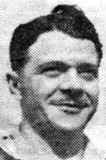
|
The 80th chieftain has had a colorful career in the Air Force. Returning from the ceremonies opening the Stilwell Road, he was piloting other officers home when an engine conked out and he had to belly-land in a pocket carved out of a nearby mountain.
Williams was unhurt, then joined the other officers who had entered the plane to look for his body. He had crawled out of the escape hatch forward.
He has had other adventures like: Taking off at Bolling Field with Chief of Staff Gen. Malin Craig on board, then having an engine conk out; having both wings of his plane shorn off 600 feet above Randolph Field; experimenting with the early B-18 and DC Douglas types of military aircraft; flying with the first B-17 group to be organized.
he represented Gen. George C. Marshall at Argentina's 75th Independence celebration; flew a goodwill tour to Brazil and received the Brazilian order of the Southern Cross; piloted Mrs. Eleanor Roosevelt to an aircraft carrier christening.
Williams initiated his career as a pilot in 1933. Since then, he has piled up more than 4,000 flying hours and eight decorations.
EMPLOYMENT REPLACES ‘CO-PROSPERITY’
Burmese Laborers Get Housing, Food, Medicine, Wages
|
But today this is but a bad dream to Maung Gyi and his village neighbors. For the "New Order" has been replaced by a small-scale United States Employment Office set up in the jungles of Burma under the direction of Lt. Robert A. Smoak, 23-year-old 10th Air Force Provost Marshal. And Maung Gyi is working every day at his trade - carpentry - with Uncle Sam his employer.
Under the employment system set up by Smoak, Burmese laborers employed by the United States Army are given housing facilities, food and medical care in addition to wages which vary according to skill.
A Burmese tribesman desiring employment with the Army contacts the head man of his village, who brings the job applicants to Smoak. After a series of examinations, during which the job-seeker is given a political checkup to determine his loyalty to the Allied cause as well as a physical inspection, he is classified as to trade and skill and put on the pay roll. Provide, of course, that he has been given a clean bill of health by the Burma Civil Affairs Office and the doctors.
Salaries vary. An unskilled laborer is paid 30 rupees (about $10) a month while a skilled craftsman such as Maung Gyi rates a pay scale of 90 rupees (about $30) monthly. The workers are quartered in a large labor camp with living accommodations in bamboo and thatch basha-barracks, 40 by 70 feet in size. Besides the barracks, the camp is equipped with three wells, brick stoves and ovens and adequate sanitary facilities.
Rations furnished the workers by the Army conform to the Burmese diet of rice, salt, sugar, dal (flour), fresh vegetables, fruits, tea or coffee and curry powder. An American innovation of cigarettes and matches is included.
health of the laborers is watched and safeguarded. The workers are inoculated against tropical diseases and are given physical examinations at regular intervals. Sick call is held in the camp each morning, at which time minor ailments are treated.
An eight-hour working day has been put into effect by Smoak. Classes of workmen in the camp include tailors, barbers, laundrymen, bearers, cooks, guards, clerks, carpenters, foremen and laborers.
On religious festival days, feast days and other Burmese holidays, the workmen get the day off. On these occasions, the workers invite their new "bosses" - Smoak and his assistant, Sgt. Noel C. Neeley - to attend the ceremonies as guests of honor.
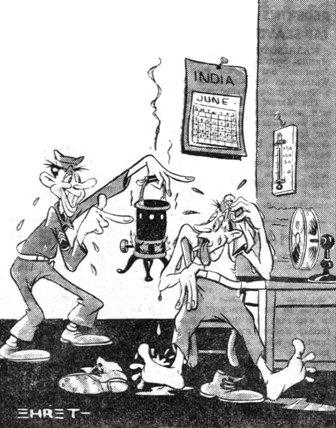 "HERE'S THAT STOVE YOU REQUESTED LAST DECEMBER."
"HERE'S THAT STOVE YOU REQUESTED LAST DECEMBER."
|
Gas Pumping Record
Claimed For ICD Unit
10TH A.F. HQ. - Averaging better than 74,000 gallons a day for April, the local Field Service Department has made claim to a new ICD record for gas pumping and servicing.
With an average of four refueling units in use at any one time, Field Service maintained its three-shift, round-the-clock schedule to pump 2,240,000 gallons of high octane gas within a 30-day period.
Under charge of Lt. Steven Vickery and T/Sgt. George Forge, this group, pumping cargo as well as fuel gas, has poured 1,035,000 gallons into C-109's, 1,140,000 gallons into C-54's and 36,000 gallons into other aircraft.
McCONKIE HEADS 142ND GENERAL
CALCUTTA - New C.O. of the 142nd General Hospital here is Col. H. S. McConkie, Cedar Rapids, Ia.
McConkie takes the place of Col. Murray M. Copeland as head of one of the largest Army hospitals in the India-Burma and China Theaters. Copeland has returned to the U.S.
The new hospital boss is a graduate of Coe College and of the medical school at Iowa University. Following graduation he entered the Army. After four years' service in the States, he went to Panama for a three-year tour of duty. He returned to the States and served there for the next 11 years, coming to India-Burma in 1945.
Chiang Resigns Post As China Premier
Roundup Staff Article
Two significant changes took place in the Chinese Government this week - Chiang Kai-shek resigned his post as premier, Dr. T. V. Soong taking over, and Dr. H. H. Kung relinquished his post as Vice Premier and Governor of the Central Bank.
Chiang, however, retains his positions of President of China and head of State. He also remains as Generalissimo of the armed forces.
United Press said Kung would retain his positions as Chiang's personal representative to President Truman, as well as many other important posts in China's industrial and financial fields. Kung, brother-in-law of Mme. Chiang Kai-shek, is now in the U.S. and has been ordered to Warm Springs for his health.
Army News Service stated reaction in Chungking to Chiang's resignation was that it tended to solidify China at a time when the Allies are increasing pressure on Japan from all quarters. It was also pointed out that Chiang can now devote a greater part of his time to the military side.
Lt. Gen. A. C. Wedemeyer, CG of U.S. Forces in China and Chief of Staff to Chiang, said this week that he took a "very optimistic" view of the military situation in China. Wedemeyer stated there was a possibility the Japs might abandon their transcontinental corridor across China.

Roundup Staff Writer Moniruddin, a young Indian left orphan by the Bengal famine, is now boning up on readin,' writin,' and 'rithmetic in an Assam school, thanks to generous contributions of the personnel at the 1328th AAF BU, ATC. For many months Moni was office boy for the Civilian Personnel Office, but is presently living with an Indian merchant while going to school. Officers and EM have donated Rs. 650, which will give Moni about two years of learning. When the heat, monsoon and loneliness of Assam frazzled their nerves, S/Sgt. William F. Briscoe and Pfc. Edwin E. Bryan took steps to restore their sunny dispositions. The short-tempered pair, both ex-psychology students and now members of the Air Service Command, decided that what they needed was "mental discipline." To achieve this, they agreed to get up one hour earlier each morning at 0530. Unfortunately, this process brought not only "mental discipline," they sadly report, but also acute physical fatigue. They're still screaming at their bearer. In recognition of their services to the British 36th Division in Burma, the Jungle Jeeps - a 10th Air Force L-5 liaison squadron - has been awarded a plaque by Maj. Gen. Francis W. Festing, 36th commander. Maj. Gen. Howard C. Davidson, commander of the 10th, presented the award on behalf of the British to Capt. Warren L. Duncan, C.O. of the L-5 squadron. During the 36th's campaign down the Railway Corridor and the Irrawaddy River, the Jungle Jeeps spotted targets for artillery and fighters, flew in supplies and reinforcements and evacuated the wounded. Capt. Dominic V. Griffo, member of the 1328th AAF BU, Assam, has found that the only good krait is a twice-killed krait. (A krait, says Webster, is a venomous snake allied to the cobra.) Griffo, Lt. Ken Maroff and three other ATC wallahs were tooling along an Assam autobahn when they spotted the yellow-banded krait. With sticks and stones and other blunt instruments they clouted the krait, stowed its remains in a compartment of their vehicle and proceeded. Few minutes later the reptile "arose from the dead" and draped itself around Maroff's leg. There was more clouting by the five officers until the krait was pronounced "deader than hell." The passenger terminal of the 1309th AAF BU at Bangalore has been greatly improved by the recent construction of a First Aid room, complete with standard equipment and sound-proofed walls. Capt. Frank E. Wall, Jr., and Sgt. Rocco Vicino are responsible for its installation. Miss Mary Louise Craddock, a former nurse, is attendant-in-charge. |
CHUNGKING - Fighter-bombers of Maj. gen. Claire L. Chennault's 14th Air Force ranged from Indo-China to the Honan and Hunan Province battlefronts this week, strafing troop and supply concentrations and bombing bridges, locomotives and motor transport.
Tungting Lake in Hupeh Province, around which the Japanese and the American Air Force have been sparring for several campaigns was the scene again this week of repeated attacks. On one mission 44 trucks were destroyed and 78 damaged. Enemy junks on the lake were also sunk.
Meanwhile, Warhawk fighters supporting the Chinese ground advance on Paoching in Central Hunan, hit Jap positions in both night and day missions. No air opposition was encountered in these missions.
Eleven American aircraft failed to return to base during the week.
BRIDGE EXPERT - BUT NO BRIDGES
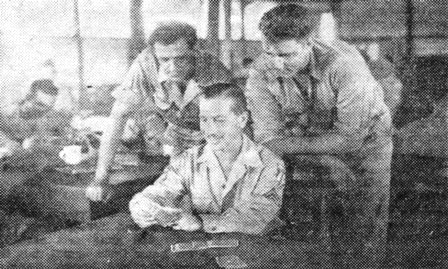 Cpl. Louis Gladstone shows two students a few of the finer points in the handling of a typical bridge hand.
Cpl. Louis Gladstone shows two students a few of the finer points in the handling of a typical bridge hand.
|
1337TH BASE UNIT, ATC - Meet India-Burma's only bridge expert outside the Engineers.
Before the warm Cpl. Louis Gladstone's profession was bridge - tutor and tournament competitor. He had schools at Providence, R.I., and New Bedford, Mass.
Now he is contributing his services to G.I.'s - for free. Working with the Red Cross here, he has conducted bridge classes and staged tournaments at which individual cups have been awarded high scorers.
Gladstone issues no written instructions or notes. He teaches students by having them play out normally-dealt hands.
In his civilian days, fast company wasn't foreign to Gladstone. He played in tournaments against such experts as P. Hal Sims and Ely Culbertson. He considers Sims the finest card expert who ever played a hand.
"He is an authority on many card games other than bridge," Gladstone said.
If a man is a winner in three of Gladstone's tournaments here, he is awarded a large engraved cup.
|
ATC MEN COIN ‘SPINEL’ AFTER JEWEL GYP |
1345TH AAF BU, ATC - The vocabulary of G.I.'s on this base has been increased by a new word, spinel.
This latest vocabulary development has been defined by G.I. grammarians and lexicographers as a transitive verb meaning to fleece, cheat, or rook.
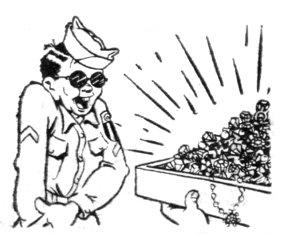
|
Origin of the word stems from an encounter between a freshly arrived G.I. and an Indian jewel merchant.
Victim of the spinelling, an eager G.I., was anxious to accumulate a fortune in precious gems. Looking for a reliable merchant, he came upon a man who spoke very charmingly, giving evidence of true friendship by warning our hero about unscrupulous merchants who prey upon Americans.
"But," said the philanthropist, "should you want some jewelry, I have some for sale." He produced a tray of gems and a ring with five rubies caught our hero's eye.
After a bit of friendly haggling, the merchant agreed to part with the five precious Burmese rubies for Rs. 165. Our hero cannily offered Rs. 100.
The merchant finally agreed to sell at Rs. 130, adding that he was only too happy to accommodate anyone who was fighting India's enemies.
lack of trust developed in our hero, a common malady, and he went to other jewelers, who appraised the ring at prices from Rs. 20 to Rs. 60, all adding that the ring contained not Burmese rubies but an inferior brand known as Spinel rubies.
Outraged, our hero rushed back to his merchant friend. caressing his Rs. 130, he swore an oath never again to allow himself to be spinelled.
Now one hears such things as "I was spinelled out of my rotation," et cetera. It has become an inspiration to chronic gripers searching for a new means of expression.
JAPANESE PLACE G.I. RADIO ANNOUNCER IN I-B HIGH ON EXECUTION LIST
Roundup Staff Article
A soldier-reporter assigned to new Delhi's Army Radio Station occupies one of the top spots on the Japanese execution list of American newscasters who have "defamed and slandered" them.
It was in October, 1943, that Pvt. Bob Greene, then a newscaster and announcer with Columbia Broadcasting System in Hollywood, inaugurated a series of stories on the Japanese Emperor.
Three times weekly for 26 weeks, Greene ridiculed and humiliated Hirohito. He taunted the Emperor and Japanese officialdom with stinging barbs and caustic criticism.
Greene's subtle innuendos and outright blasts infuriated the Japs, who were kept busy trotting to Hirohito and apologizing for the "insults by the West Coast announcer."
Among the choice verbal punches the announcer threw at the Emperor were the following:
"The Emperor is a bum."
"He sat astride his horse like he was part of it. And in my opinion - he was."
"He likes shrimp - the shrimp."
His prize slap was, "A Son of Heaven." With a definite pause between the letter "H" and the rest of the word.
Shortly after Greene concluded his series, CBS engineers monitored a Radio Tokyo broadcast by a Nip propagandist who chattered how some American newscasters were going to meet death when Japan defeated the United States.
"Certain American newscasters," the enemy station announced, "not only take the military might of Japan too lightly but have gone as far as to broadcast insults and lies about the Japanese Emperor. One announcer in particular broadcasts from a West Coast station. His name id Bob Greene. It please us to announce that his name has been placed, along with others, on top of our execution list."
|
Roundup Staff Article
Dolemn tribute was pair to America's war dead as the nation celebrated its 77th Memorial Day this week with parades, religious services and quiet ceremonies, all tempered by the sober realization that the war with Japan is yet to be won.
War plants and Government offices operated as usual after Navy Secretary James V. Forrestal broadcast to the nation: "With us, the living, remains the responsibility of building a real memorial by our day to day support of the fighting men in the Pacific."
Practically every large city, however, paused long enough for parades. In Chicago, celebrants jammed sidewalks as a 15-mile parade streamed by. One hundred thousand New Yorkers participated in five separate processions. Schools and the business district in Boston were closed as the city observed the traditional ceremony.
AT HALF MAST
In San Francisco, flags of the 48 visiting nations were cased, with only the Stars and Stripes displayed at half mast. At noon, it was hoisted to full staff and the other flags appeared.
Two fallen soldiers were singled out for special tribute: The Unknown Soldier in Arlington Cemetery and Franklin Delano Roosevelt in the Hyde Park cemetery. Their flag-draped graves were decorated with wreaths following religious services.
200,000 DEAD COMRADES
At the same time, from Anzio to Okinawa, Americans in uniform paid silent, sober tribute to 200,000 comrades killed in World War II. In Italy, France, and Germany, Yanks stood with bowed heads as Taps were played over American graves. Catholic, Protestant, Jewish religious services were held. On Guam, native children made flowered wreaths and placed them on the graves of U.S. Marines, soldiers, sailors.
From Washington came the announcement that U.S. casualties, both Army and Navy, now total 1,002,887. To this a high-ranking Navy official added the sentiments of the entire American people when he solemnly asserted:
"We cannot and will not let them down."

THE DEVIL'S DILEMMA I met the Devil yesterday beneath a shady tree; His head within his hand was held, his elbow on his knee. A frown he wore upon his brow; his horns were dull with dust, And resting on his arm I saw his pitchfork red with rust. "Well, " I said, "what can it be that brings you up from Hell? From all appearances it seems that things aren't going well." He gazed at me with blood-shot eyes and bade me take a seat, And so I sat and wondered why his face bore sad defeat. |
|
"O, Mortal, know," he spoke, "that once I ruled a proud domain; Within the bowels of Earth I reigned o'er punishment and pain. The souls of those were sent to me who'd lived in sin and hate, To suffer for eternity upon hot Hades grate. My tortures were most terrible, no others could compare, I though I had the latest thing in fire and brimstone there But then came war upon the Earth with tanks and planes and guns, And implements of war ne'er seen before beneath the sun. Now all the souls that go below who've failed the living test, No longer fear my kingdom, but go as if to rest! But I must leave; I've dallied long and must be on my way. I'm off to meet St. Peter and you'll pardon me, I pray; I have a plan we must discuss that may unscramble this, For Earth's no longer what it was; it's Hell, that's what it is." - BY S/SGT. G. W. HICKOX |
MONSOON SPLASHES FIRST BURMA RODEO
BHAMO - The Wild West coupled with a wilder monsoon featured the first annual Burma Rodeo here recently.
Fifty-four G.I. cowboys rode the amphibious broncs and bulls and roped the flying calves at the specially-constructed ARC Ace of Clubs rodeo arena before a large crowd that braved the rains to witness the unusual event.
The star of the show, voted the best all-around cowboy, was Pfc. Cecil McKinney, of El Reso, Okla. McKinney won first places in calf roping and ribbon roping competition. Cpl. J. R. Smith, Beeville, Tex.; Pfc. Ben Kramer, Behnam, Tex.; and Pvt. Bill Hightower, Ft. Worth, Tex., captured the runner-up positions.
SADDLE BRONC CHAMP
Pfc. Richard Keen, Henrietta, Tex., bounced his way across the muddy arena to bag the saddle bronc riding championship, with Pfc. Lou Mosley, Mostey, Mont.; Pfc. Ernie Mutch, Browning, Mont.; and Pfc. Frank Garsean, La Plant, S.D., taking consolation honors.
The bareback bronc riding title was won by Pfc. Herb Copeland, Belle Fourche, S.D., who also was judged third best all-around cow-puncher. Second place in this event went to Pfc. Bill Dillon, Denver, Colo., followed by Pfc. Joe Chavez, Gallup, N. Mex., and Mutch. Mutch also copped the bull riding contest, giving him enough points to follow the title winner.
TRICK RIDER
A special attraction of the show was the spectacular trick and fancy riding by Pfc. Bob McCoy, Oklahoma City, Okla., and Pfc. John Gannon, Chicago. Gannon, in bright yellow and a pearl-white ten gallon hat, gave a roping exhibition, in addition.
The director of the show was Capt. R. T. Caperton, Bronte, Tex., assisted by S/Sgt. Jim Williams and Pfc. Popcorn Walters, Pampa, Tex. Chief clown was Pfc. Clyde Neely, Pinedale, Wyo., aided by a frisky grey tonga pony and a hard riding monkey.
|
Last Days In Theater
Rough On Returnees
by S/Sgt. KARL PETERSON Ex-Roundup Staff Writer
You weeds-wallahs can't be expected to feel any sympathy for the troubles of a fellow doggie preparing to shuffle over the hill homewards, but with our editorial tongue in cheek (which greatly improves our appearance) the Roundup gives herewith the harrowing details of a returnee's last days in India-Burma sweating out those happy orders and departure.
It's not likely that this account will cause any future homebound lads to flounce off in a furlined huff and say, "T'hell with it, I'd rather stay out here!" but nevertheless there are sundry irritations that make your last three days in the Theater seem longer than the first three years.
In the first place, an old hand at rumor-booming, becoming eligible for that bon voyage, will have been tipped off in advance by his private pipeline to the personnel section. But the pipeline invariably proves to be as clogged up as ever, and the rumor that "your orders are comin' out Saturday for sure" turns up a blank.
Meanwhile, you have frantically dashed about, packing barracks bags and giving away excess belongings in a fine frenzy of largesse. Your friends, knowing damn well you have to make that 65-pound air travel baggage allowance, are not taken in by your generosity, and cast appraising vulture-like eyes over the piled-up gear which must be jettisoned.
As the days drag by and no orders, you must live out of a barracks bag, burrowing like a Wisconsin badger every time you want a clean handkerchief.
And laundry. To send or not to send. At first, all optimism, you hold up, gleefully reminding your buddies that you don't want to wait around for any laundry to come back after you've got those papers in your hand. Then, days later, you've got a sackful of "doity shoits" and a mind full of horrible doubt, so you seize the situation in your teeth and bundle the lot off to the Dhobi with a fine, careless gesture. (This is late in the game, and sending out your laundry promptly brings those orders, just as sure as picnics bring rain.)
At the office all your associates are filled with joy at the news of your good fortune. They crowd around to extend congratulations and pump your hand, try out the carriage on your new typewriter and test the drawers in your big, fancy double-desk. The most profound congratulations come from the junior members of the firm, who cluster nearby to gaze at your chevrons with what is known as "hole-in-the-T/O" anticipation in their eyes. And the boss, overnight, has become your brother. With his arm draped lovingly around your shoulders he laments, "Sure going to miss you, Sergeant, although I'm mighty glad to see you get the break, yessir, mighty glad - er, see if you can't get all those reports finished before you take off."
During those last draggy days as you wait and wonder "Where can those orders be?" the problem of taking leave of your friends and acquaintances around town becomes progressively more thorny. At first it's easy: "Hey there, boy, hear you're going home. A feather merchant, eh? Well, if I don't see you again, so long and takeiteasy." A hearty handshake, and the farewell has been neatly accomplished.
Days later, you meet again. "Oh, haven't you got away yet, huh? Going home, you lucky dog. Well, so long and takeiteasy." Repeat business of handshake.
Ensues another interval of two days. You are standing mournfully, drinking a tear-filled beer. You have just made 16 different answers to 16 passing acquaintances who have cheerfully inquired, "Say, when the hell are you going home?" You turn to ask someone for a match. It's him, and an embarrassed silence falls.
"What, are you still here?" he roars, and you stand there muttering meekly something about - "any day now, got to go through channels, y'know. Ha! Ha!"
His manner is perceptibly cooler now, but he's still game: "Well, so long, good luck and takeiteasy," and he shoves out that old mitt.
On the following day you cross over to the other side of the street when you see him coming, and take refuge behind a convenient rickshaw stand.
And when, at last, you're in, there is a final fleeting qualm: what about civilian life? Think of having no one to tell you what to do, having to make your own decisions - which suit to put on in the morning, what color socks to wear? And suppose the guys who've been discharged ahead of you have got all the best apple-selling corners and sidewalk pencil locations sewed up in your home town? Yessir, we almost changed our mind - it says here.
The Roundup is a weekly newspaper of the United States Forces, published by and for the men in Burma and India, from news and pictures supplied by staff members, soldier correspondents, Army News Service and United Press. The Roundup is published Thursday of each week and is printed by The Statesman in New Delhi and Calcutta, India. Editorial matter should be sent directly to Capt. Floyd Walter, Hq., U.S.F., I.B.T., APO 885, New York, N.Y. and should arrive not later than Saturday in order to be included in that week's issue. Pictures must arrive by Friday and must be negatives or enlargements. Stories should contain full name and organization of sender. Complaints about circulation should be sent directly to Lt. Drexel Nixon, Base Section, APO 465, New York, N.Y. Units on the mailing list should make notification of any major change in personnel strength or any change of APO.

|
JUNE 7, 1945
Adapted from the original issue of India-Burma Theater Roundup shared by Linda James
Copyright © 2009 Carl Warren Weidenburner
TOP OF PAGE PRINT THIS PAGE ABOUT THIS PAGE SEND COMMENTS
PREVIOUS ISSUE CLOSE THIS WINDOW NEXT ISSUE

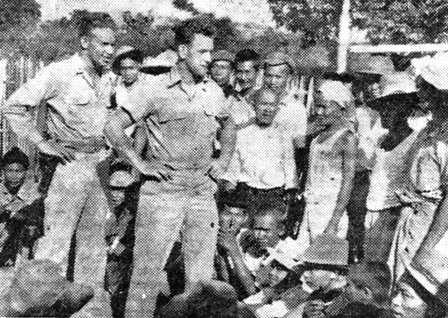 Lt. Robert A. Smoak and another American interview a group of Burmese refugees now working for Uncle Sam.
Lt. Robert A. Smoak and another American interview a group of Burmese refugees now working for Uncle Sam.
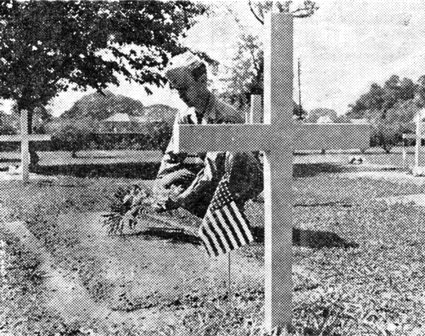 U.S. forces serving in the Calcutta area observed Memorial Day by honoring their fallen comrades at the American
Military Cemetery. Cpl. Frank G. Vlodyka, above, places a wreath on a grave. Brig. Gen. Robert R. Neyland,
Commanding General of Base Section, was principal speaker at the services.
U.S. forces serving in the Calcutta area observed Memorial Day by honoring their fallen comrades at the American
Military Cemetery. Cpl. Frank G. Vlodyka, above, places a wreath on a grave. Brig. Gen. Robert R. Neyland,
Commanding General of Base Section, was principal speaker at the services.
